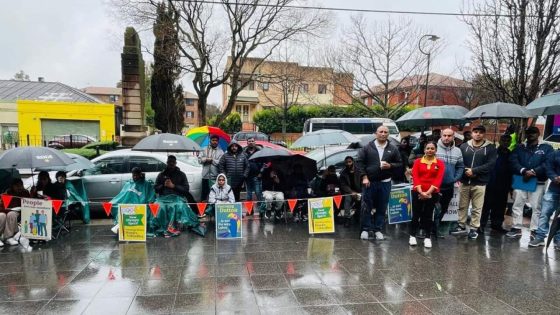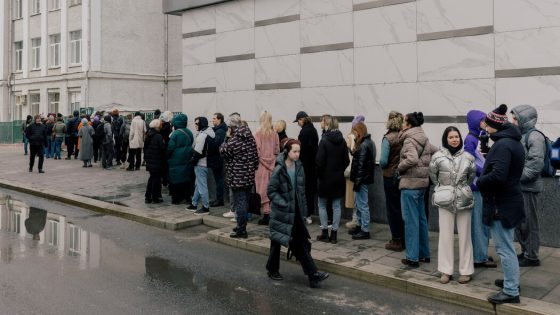Shafiq ur-Rehman is among hundreds of refugees staging a ‘sit-in’ protest outside the Sydney electorate office of newly minted Immigration Minister Tony Burke.
“I pay my taxes on time, I’m not involved in any criminal activities. I’m requesting the Australian government grant us permanent visas,” he told SBS Urdu.
A member of the moderate Muslim community, Rehman said he was forced to flee extremists who were imposing their interpretation of extreme Islam in his hometown of Hangu, Khyber Pakhtunkhwa.
It had been 11 years since he last saw his wife and two of his three daughters, he said.
He said his application for permanent residency was rejected by the Department of Immigration in 2021.
He said the reason given for the rejection — that the situation in his hometown was no longer dangerous — was untrue. Rehman has been living in Australia on a bridging visa that does not permit him to work.
“My life was in danger in northern Pakistan, so I came to Australia in 2013. When my (third) daughter was born, I was in a detention centre, and I still haven’t seen her,” he said.
Arad Nik, an Iranian refugee, was one of the organisers of the sit-in protest which started on 6 August.
He told SBS Urdu the protesters were calling for a “fair decision” from the government regarding residency because currently, close to 10,000 refugees were living in uncertainty.
Asylum seekers have staged a sit-in protest in front of the Immigration Minister’s office. Credit: Supplied
According to the , as of 31 June 2024, almost 40,000 individuals who arrived by boat were issued a Bridging Visa E.
Of these, 9,892 remained in the community, while the rest had either been granted a substantive visa, left Australia, been detained, or had died.
As of 31 June 2024, 9,892 of 37,934 boat arrivals on Bridging Visa E remain in the community; others have been granted visas, left Australia, been detained or are deceased.
Most of this cohort had been in this situation for more than 10 years, unable to either return to their home countries or live here with any sense of security, Nik said.
Rehman said despite his multiple letters to the authorities and appeals of his case, his request for a permanent visa had been repeatedly denied.
“I have tried to start a new life here, but it’s very difficult without a work permit,” he said.
“If I am granted PR, it will open the door for my family to join me here in Australia, where we can live peacefully.
“The local Taliban destroyed the girls’ school in my hometown, leaving my daughters unable to get an education.”
On 13 February 2023, the Albanese government declared it would abolish the temporary protection policy.
This decision allowed those with a Temporary Protection Visa (TPV) or Safe Haven Enterprise Visa (SHEV) to apply for a permanent Resolution of Status (RoS) Visa.
Existing applications to renew expired TPVs or SHEVs would be automatically converted to RoS visa applications.
Those still awaiting a decision would receive a RoS visa once their need for refugee protection was assessed.
Another protester, Kalyani, said she was representing Tamil refugees from Sri Lanka.
“Having fled worsening conditions in their home country, many of them now look towards securing permanent residency as their new hope,” she said.
The Migration Amendment (Removal and Other Measures) Bill 2024 proposes changes to the Migration Act 1958, allowing the minister to issue removal directions, enforce penalties and overturn protection decisions.
Protesters are demanding certainty about their own and their children’s futures, as well as clear rights regarding work, study, family reunification and healthcare, with assurances against arbitrary removal.
In May, former Immigration Minister Andrew Giles defended the bill as necessary to address a “loophole” made more apparent by a recent High Court decision.
issued a statement on its website criticising the fast-track visa system.
It highlights that, a decade later, thousands of men, women and children continue to live in fear of being removed from the places they’ve called home for years.
In a statement issued to a Department of Home Affairs spokesperson said: “The government has taken steps to reform the migration and protection visa review processes by abolishing both the Immigration Assessment Authority (IAA) and the fast-track assessment process.”
A new Administrative Review Tribunal (ART) will begin operations on 14 October 2024, the spokesperson said.
The Refugee Council has called on the government to allow the men, women, and children failed by this “flawed” system to be granted permanency to truly rebuild their lives as part of the community.
Refugee supporters are calling for urgent protection to address the widespread mental health and homelessness issues arising from the lack of a safety net and certainty while refugees wait for their protection claims to be heard. Credit: Combined Refugee Action Group
Until the new ART commences, the IAA will continue to operate. Any decision under review at the IAA, or which would have otherwise been referred to the IAA for review, will be transitioned to the tribunal upon commencement, as a reviewable protection decision.
The spokesperson added that those who were found to not engage Australia’s protection obligations, are not awaiting merits or judicial review outcomes, and had exhausted all avenues to remain in Australia were expected to depart Australia voluntarily and could be provided assistance to depart.
Rehman said he was doing everything he could to reunite with his family.
“My daughters are growing up, and I’m missing out on the important moments of their lives. I’m a father, and I want to fulfil my responsibilities,” he said.





